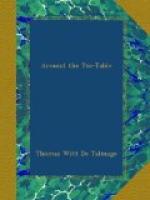Postal cards are likewise a relief to that large class of persons who by sealed envelope are roused to inquisitiveness. As such a closed letter lies on the mantel-piece unopened, they wonder whom it is from, and what is in it, and they hold it up between them and the light to see what are the indications, and stand close by and look over your shoulder while you read it, and decipher from your looks whether it is a love-letter or a dun. The postal card is immediate relief to them, for they can read for themselves, and can pick up information on various subjects free of charge.
But, after all, the great advantage of this new postal arrangement is economy in the consumption of time. It will practically add several years to a man’s life, and will keep us a thousand times, at the beginning of our letters, from saying “Dear Sir” to those who are not at all dear, and will save us from surrendering ourselves with a “Yours, truly,” to those to whom we will never belong. We hail the advent of the postal-card system.
CHAPTER XLIX.
Royal marriages.
There has lately been such a jingle of bells in St. Petersburg and London that we have heard them quite across the sea. The queen’s son has married the daughter of the Russian emperor. We are glad of it. It is always well to have people marry who are on the same level. The famous affiancing in New York of a coachman with the daughter of the millionaire who employed him did not turn out well. It was bad for her, but worse for the coachman. Eagle and ox are both well in their places, but let them not marry. The ox would be dizzy in the eyrie, and the eagle ill at home in the barnyard. When the children of two royal homes are united, there ought be no begrudging of powder for the cannonading, or of candles for the illumination. All joy to the Duke of Edinburgh and his fortunate duchess.
But let not our friends across the sea imagine that we have no royal marriages here in this western wilderness. Whenever two hearts come together pledged to make each other happy, binding all their hopes and fears and anticipations in one sheaf, calling on God to bless and angels to witness, though no organ may sound the wedding-march, and no bells may chime, and no Dean of Westminster travel a thousand miles to pronounce the ceremony,—that is a royal marriage.
When two young people start out on life together with nothing but a determination to succeed, avoiding the invasion of each other’s idiosyncrasies, not carrying the candle near the gunpowder, sympathetic with each other’s employment, willing to live on small means till they get large facilities, paying as they go, taking life here as a discipline, with four eyes watching its perils, and with four hands fighting its battles, whatever others may say or do,—that is a royal marriage. It is so set down in the heavenly archives, and the orange blossoms shall wither on neither side the grave.




